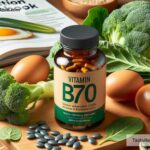The Role of Vitamin B7 in Metabolic Health
Vitamins are essential nutrients that help our bodies work properly. Each vitamin has a unique role, and today we’re going to talk about Vitamin B7, which is also known as biotin. While this vitamin may not be as famous as Vitamin C or D, it plays an important role in keeping us healthy, especially when it comes to metabolism. Keep reading to learn more about Vitamin B7, where to find it, why it’s important, and how it contributes to metabolic health.
What is Vitamin B7 (Biotin)?
Vitamin B7 is part of the B-vitamin family, which includes several vitamins that are essential for energy production and the function of cells. B7 is a water-soluble vitamin, meaning your body doesn’t store it for long periods of time. Instead, you need to get small amounts of it regularly from your diet.
Biotin is often nicknamed the “beauty vitamin” because of its role in supporting healthy hair, skin, and nails, but it does much more than that. Its major job is helping your body break down food into energy, which is why it’s so important for metabolic health.
What is Metabolism?
To understand how Vitamin B7 supports metabolism, it’s helpful to know what metabolism is. Metabolism refers to all the chemical processes in your body that keep you alive and functioning. These processes include breathing, digesting food, repairing cells, and creating energy.
Food provides nutrients like carbohydrates, fats, and proteins. Your body uses metabolism to break down these nutrients into smaller parts, which can then be used for energy. A healthy metabolism is crucial for maintaining energy levels, managing weight, and supporting overall health.
How Does Vitamin B7 Help Metabolic Health?
Vitamin B7 is one of the key players in metabolism because it helps enzymes do their jobs. Enzymes are proteins that speed up chemical reactions in the body, including the process of breaking down food.
Here’s how Vitamin B7 plays a role in metabolic health:
-
Breaking Down Nutrients
Biotin helps enzymes break down carbohydrates, fats, and proteins. For example, when you eat a piece of bread, your body needs to convert the carbohydrates into glucose (a type of sugar) to use as energy. Biotin assists with this conversion, ensuring your body gets the fuel it needs. -
Energy Production
After nutrients like carbohydrates and fats are broken down, the energy is stored in molecules called ATP (adenosine triphosphate). ATP is what your cells use to perform all their functions. Without enough biotin, this process can slow down, making your body less efficient at producing energy. -
Building Stronger Cells
Biotin also helps your body make fatty acids, which are an important part of healthy cells. Fatty acids are like building blocks that help maintain cell structure and function. Healthy cells mean a healthier body overall. -
Regulating Blood Sugar
Biotin plays a role in balancing blood sugar levels by improving how your body processes glucose. Stable blood sugar is important for energy and preventing conditions like diabetes.
Signs of Biotin Deficiency
Since Vitamin B7 is involved in so many processes, it’s important to get enough of it. Though biotin deficiency is rare, it can happen if you don’t eat enough foods that contain biotin or if your body has trouble absorbing the vitamin.
Here are some signs of biotin deficiency:
- Feeling tired or weak
- Hair thinning or falling out
- Dry, scaly skin
- Muscle pain or cramps
- Digestive issues
If you notice these symptoms, it’s a good idea to speak with a doctor, as something else could also be causing them.
Foods That Contain Biotin
The good news is that many foods contain biotin, and it’s easy to get enough of this vitamin through a balanced diet. Here are some foods that are natural sources of biotin:
- Eggs (especially egg yolks)
- Nuts (like almonds, walnuts, and peanuts)
- Seeds (such as sunflower seeds)
- Fish (like salmon and tuna)
- Meat (particularly liver)
- Dairy products (like milk and cheese)
- Vegetables (such as sweet potatoes, spinach, and broccoli)
- Fruits (like bananas and avocados)
Additionally, some foods, like cereals and bread, may be fortified with biotin, which means extra biotin is added to them.
How Much Vitamin B7 Do You Need?
Most people get enough biotin from their diet, but the exact amount you need depends on your age and lifestyle. For adults, the recommended daily amount is around 30 micrograms, but pregnant or breastfeeding women may need more.
If you’re considering a biotin supplement, it’s best to consult a healthcare provider first. Taking too much biotin through supplements is usually harmless, since it’s water-soluble and your body eliminates any excess, but it’s always smart to follow professional advice.
Final Thoughts
Vitamin B7 (biotin) is a small nutrient with a big role in metabolic health. By helping enzymes break down food, produce energy, and support healthy cells, biotin ensures our bodies function efficiently. To keep your metabolism running smoothly, make sure to include biotin-rich foods in your diet, such as eggs, nuts, seeds, and leafy greens.
Overall, it’s easy to overlook vitamins like biotin, but they are essential for health and well-being. By making small, mindful choices about what you eat, you can support your metabolic health and feel your best. Remember, your body relies on you to provide it with the nutrients it needs to thrive!

